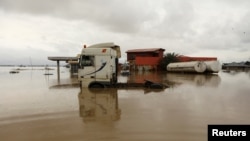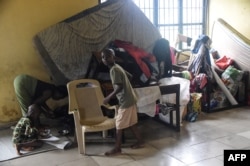Nigerian authorities are warning citizens of intense flooding ahead of this year's rainy season.
Typically, Nigeria sees significant rainfall between June and October, and last year the country saw its worst flooding in a decade, which the United Nations said killed more than 600 people and displaced about 1.4 million.
The threat of intense rains earlier than expected will be bad for vulnerable communities, the U.N. said, especially those who are still suffering from last year's flooding.
In the closely built temporary sheds in northeastern Nigeria's Gwoza Borno State, thousands who fled conflict find shelter. The camp is among more than 70 supported by the United Nations' International Organization for Migration, or IOM.
Last year, severe flooding hit the camp and ravaged many shelters, displacing — for a second time — some 10,000 people.
Now, IOM is constructing drainage canals in the camp ahead of the rainy season.
"In the camps, they already have so little to themselves and when the rains come in as we saw last year, they destroyed essentially everything," said Prestage Murima, IOM's deputy chief of mission.
Last year's flooding was fueled by unprecedented heavy rainfall in combination with the release of excess water from Lagdo dam in northern Cameroon.
The National Emergency Management Agency, or NEMA, said about 600 people were killed and 3 million were affected across 31 out of Nigeria's 36 states.
Now, NEMA is warning of a significant risk of heavy flooding across the country in the coming months.
"Our goal is to minimize loss, because we know that they do not have enough resources to do this for themselves and they're already in a vulnerable state," Murima said. "So, we want to maintain their dignity as much as possible. We encourage the community members themselves to come in and do the work."
In addition to drainage canals, IOM is promoting hygiene and awareness campaigns on the risks of disease outbreaks — especially cholera. Flooding last year triggered a deadly cholera outbreak in the area.
Borno State is the most impacted by armed conflict in Nigeria. Millions of displaced people are in staggering need of humanitarian assistance, especially food.
In another camp near Nigeria's border with Cameroon, residents like Jennifer Abajidda said they're still facing the impact of last year's floods.
"Flood and elephants destroyed our plants and because of that some of us go to Cameroon to farm to get some money for food," she said. "Some others take big risks to go to the bush to get some firewood to sell."
U.N. Resident and Humanitarian Coordinator Matthias Schmale said climate change is to blame and that authorities must improve spending on infrastructure.
"There's no doubt what we're seeing here is the impact of climate change and so, of course, there needs to be serious investment into climate change adaptation and mitigations such as planting mangroves and bamboos along roads and reinforcing riverbanks," Schmale said.
With more publicity and awareness about extreme weather, authorities hope to reduce the impact of flooding in Nigeria this year.





